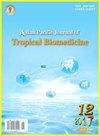Cryptotanshinone ameliorates cladribine-induced cognitive impairment in rats
IF 1.7
4区 医学
Q3 TROPICAL MEDICINE
引用次数: 0
Abstract
Objective: To evaluate the neuroprotective effect of cryptotanshinone against cladribine-induced cognitive impairment in rats. Methods: Rats were administered with cladribine (1 mg/kg, p.o.) and cryptotanshinone (10 and 20 mg/kg, i.p.) for four weeks. Behavioral tests such as Morris water maze and elevated plus maze were conducted to check memory impairment caused by cladribine. On day 29, all rats were sacrificed, and the brains were separated for estimation of neuroinflammatory factors, biochemical parameters, neurotransmitters, Aβ(1-42), blood-brain barrier permeability, nuclear factor erythroid 2-related factor 2 (Nrf2), and brain-derived neurotrophic factor (BDNF). Results: Treatment with cryptotanshinone dose-dependently enhanced spatial memory, improved the levels of neurotransmitter and antioxidant enzymes, and suppressed proinflammatory cytokine release. Cryptotanshinone also decreased Aβ(1-42) accumulation and increased the levels of Nrf2 and BDNF in the hippocampus. Additionally, the histopathological results showed that cryptotanshinone reduced cladribine-induced neuronal death in the hippocampus. Conclusions: Cryptotanshinone exhibits a promising neuroprotective effect against cladribine-induced cognitive impairment in preclinical studies, and may be a potential phytochemical for the treatment and management of cognitive impairment.隐丹参酮改善克拉德里平诱导的大鼠认知障碍
目的:评价隐丹参酮对克拉屈滨诱导的大鼠认知功能障碍的神经保护作用。方法:给大鼠注射克拉屈滨(1mg/kg,p.o.)和隐丹参酮(10mg/kg和20mg/kg,i.p.)4周。行为测试如Morris水迷宫和高架+迷宫,以检查克拉屈滨引起的记忆障碍。第29天,处死所有大鼠,分离大脑以评估神经炎症因子、生化参数、神经递质、Aβ(1-42)、血脑屏障通透性、核因子-红细胞2型相关因子2(Nrf2)和脑源性神经营养因子(BDNF)。结果:隐丹参酮剂量依赖性地增强了空间记忆,提高了神经递质和抗氧化酶的水平,并抑制了促炎细胞因子的释放。隐丹参酮还降低了Aβ(1-42)在海马中的积累,并增加了Nrf2和BDNF的水平。此外,组织病理学结果显示,隐丹参酮减少了克拉屈滨诱导的海马神经元死亡。结论:隐丹参酮在临床前研究中对cladribine诱导的认知障碍具有良好的神经保护作用,可能是治疗和管理认知障碍的潜在植物化学物质。
本文章由计算机程序翻译,如有差异,请以英文原文为准。
求助全文
约1分钟内获得全文
求助全文
来源期刊

Asian Pacific journal of tropical biomedicine
Biochemistry, Genetics and Molecular Biology-Biochemistry, Genetics and Molecular Biology (miscellaneous)
CiteScore
3.10
自引率
11.80%
发文量
2056
审稿时长
4 weeks
期刊介绍:
The journal will cover technical and clinical studies related to health, ethical and social issues in field of biology, bacteriology, biochemistry, biotechnology, cell biology, environmental biology, microbiology, medical microbiology, pharmacology, physiology, pathology, immunology, virology, toxicology, epidemiology, vaccinology, hematology, histopathology, cytology, genetics and tropical agriculture. Articles with clinical interest and implications will be given preference.
 求助内容:
求助内容: 应助结果提醒方式:
应助结果提醒方式:


